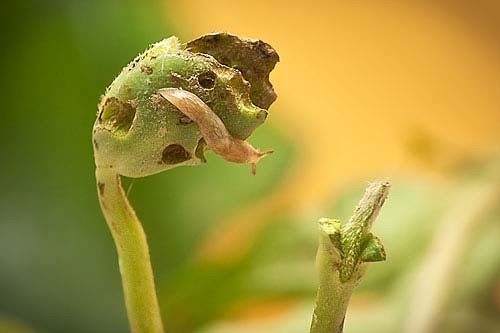Insecticides aimed at controlling early-season crop pests, such as soil-dwelling grubs and maggots, can increase slug populations, thus reducing crop yields, according to researchers at Penn State and the University of South Florida.
"Neonicotinoids are the most widely used insecticides in the world," said Margaret Douglas, graduate student in entomology at Penn State. "Seed applications of neonicotinoids are often viewed as cheap insurance against pest problems, but our results suggest that they can sometimes worsen pest problems and should be used with care."
According to John Tooker, associate professor of entomology, Penn State, recent research links neonicotinoids with negative effects on pollinators and pollution of surface water in agricultural ecosystems, and even with cascading negative effects on aquatic invertebrates and insect-eating birds. However, the effects of these common seed-applied insecticides on soil-dwelling creatures have been little explored.
"Our research suggests that neonicotinoids can have unintended costs, even within crop production," he said.
The researchers conducted laboratory and field experiments. In the lab, they exposed slugs to three types of soybeans —untreated soybeans, soybeans whose seeds were treated with fungicide, and soybeans treated with fungicide and seed-applied thiamethoxam, a very common neonicotinoid. The team then tracked slug weight and survival. Next, the scientists presented slugs from the treatments to a ground beetle species that eats slugs. They then tracked slug mortality and symptoms of beetle poisoning.
 Slugs were unaffected by neonicotinoid insecticides, likely because they are mollusks and not insects, but they did pass the insecticides to their predators. Source: Margaret Douglas/Penn State |
In a separate field experiment, the researchers planted quarter-acre plots with soybean seeds that were either untreated or treated with a neonicotinoid. In the plots, the team tracked crop establishment and growth, slug and predator populations, and predation. The scientists submitted samples from their laboratory and field experiments to an analytical laboratory to measure levels of neonicotinoids in soil, plants, slugs and beetles.
The results will appear in the December issue of the Journal of Applied Ecology.
"In our lab work, we found that slugs were unaffected by the fungicides and also unaffected by the neonicotinoid insecticides, likely because they are mollusks and not insects," said Tooker. "But the slugs did transmit the insecticide to the ground beetles, impairing or killing more than 60% of the beetles."
 This image shows a Chlaenius tricolor, a ground beetle species that eats slugs. The researchers found that slugs transmitted the neonicotinoid insecticide to predatory ground beetles, impairing or killing more than 60 percent of the beetles. Source: Ian Grettenberger/Penn State |
In the field, the team found that the neonicotinoid treatments depressed activity of insect predators, thereby relaxing predation of slugs and reducing soybean densities by 19% and crop yield by 5%.
"Slugs are among the most challenging pests faced by Mid-Atlantic no-till growers," said Tooker. "Our research reveals that neonicotinoids can indirectly increase slug damage to crops by poisoning insects that eat slugs. As a result, crop yields are lower."
According to Tooker, their results also confirm that predatory insects can provide significant control of slugs.
"This phenomenon dispels the common belief in the U.S. that insect predators do not contribute to slug control," he said. "It also emphasizes that if growers care for these predator populations they can help with slug control."
The USDA’s Northeast Sustainable Agriculture Research and Extension program, the Pennsylvania Department of Agriculture and the Maryland Grain Producers Utilization Board supported this work.
Also working on this project was Jason Rohr, associate professor of integrative biology, University of South Florida.
Headline image details: Slugs are among the most challenging pests faced by Mid-Atlantic no-till growers. Nick Sloff/Penn State






